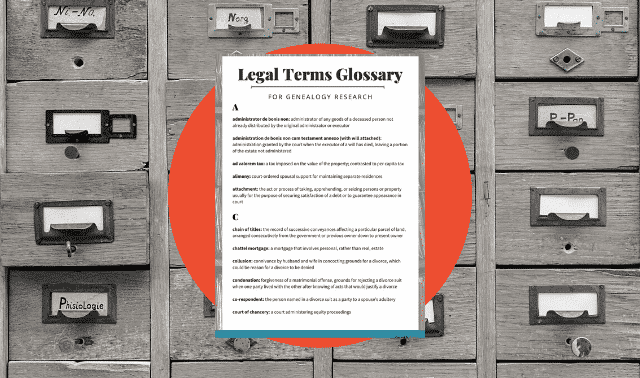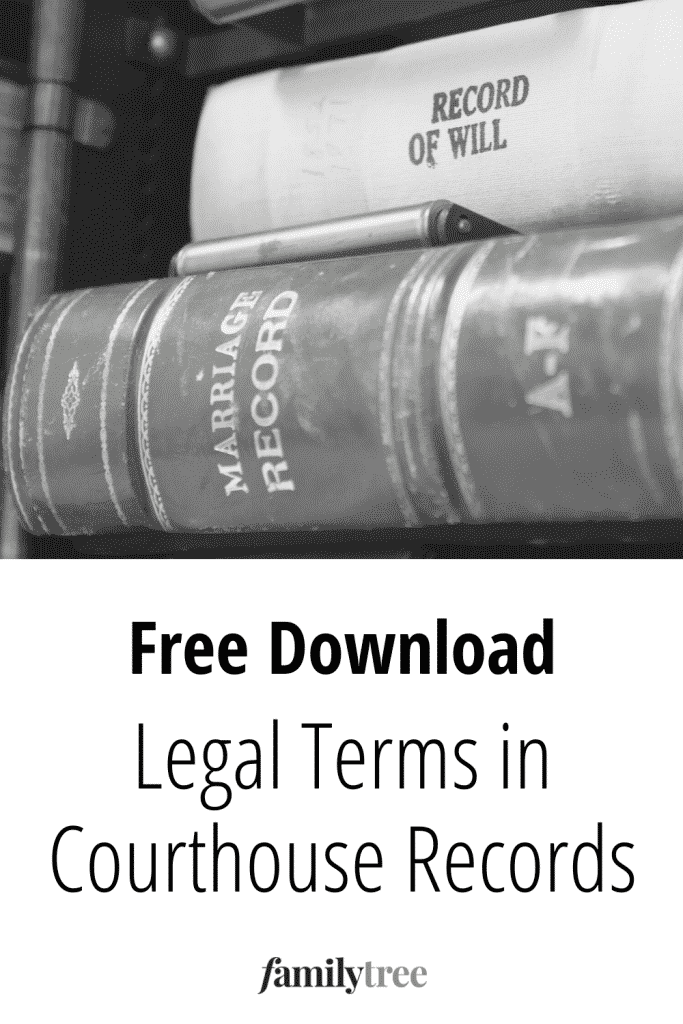
Use this glossary of common legal terms to decipher courthouse records in your family’s history. Don’t forget to grab your free download to keep on your desktop or in a family research binder.
Get Your Free Genealogy Forms
"*" indicates required fields
A
abstract: A summary of the important aspects of a document
administrator/administratrix: Person or persons appointed by the court to administer an intestate estate (administrator, male; administratrix, female)
administrator de bonis non: Administrator of any goods of a deceased person not already distributed by the original administrator or executor.
administration de bonis non cum testament annexo (with will attached): Administration granted by the court when the executor of a will has died, leaving a portion of the estate not administered.
ad valorem tax: A tax imposed on the value of the property; contrasted to per capita tax.
alimony: Court-ordered spousal support for maintaining separate residences.
attachment: The act or process of taking, apprehending, or seizing persons or property usually for the purpose of securing satisfaction of a debt or to guarantee appearance in court.
C
chain of titles: The record of successive conveyances affecting a particular parcel of land, arranged consecutively from the government or previous owner down to present owner.
chattel mortgage: A mortgage that involves personal, rather than real, estate.
collusion: Connivance by husband and wife in concocting grounds for a divorce, which could be reason for a divorce to be denied.
codicil: An amendment to a will
condonation: Forgiveness of a matrimonial offense, grounds for rejecting a divorce suit when one party lived with the other after knowing of acts that would justify a divorce.
co-respondent: The person named in a divorce suit as a party to a spouse’s adultery.
court of chancery: A court administering equity proceedings.
court of common pleas: The court where civil and criminal cases are begun. Most of these have been abolished, with jurisdiction transferred to district or circuit courts.
court of the ordinary: In Georgia, the court that formerly had exclusive and general jurisdiction over probate of wills, management of estate, and appointment of guardians.
court of orphans: The court in Pennsylvania or Maryland—known else where as Surrogate or Probate court—with general jurisdiction over matters of probate.
curtesy: The estate to which a man was entitled by the death of his wife that she had seized in either fee simple or entail, provided they have children born alive and capable of inheriting, i.e., not mentally incapable of managing financial affairs. It is a freehold estate for the term of his natural life. (In some states there was no requirement that issue be born of the union.)
D
decree nisi: An order for divorce that takes effect only after the passage of a certain amount of time.
deed of gift: The conveyance of land without consideration (payment).
deposition: The testimony of a witness taken under oath from a distance, rather than in open court. A written transcript is made and becomes part of a permanent court record.
divorce a mensa et thoro: “Divorce from bed and board,” or a state like today’s legal separation; neither party could remarry.
divorce a vinculo matrimonii: Absolute divorce; it sometimes freed at least one party (the “innocent” one) to remarry.
dower: A provision by law that entitles the widow to a life-estate in the lands and tenements of her husband at his death if he dies intestate, or if she dissents from his will. Dower has been abolished in the majority of states. Although it was traditionally one third of the estate, there was wide variation among colonies and states.
dowry: The property that a woman brings to her husband at their marriage; sometimes referred to as “her portion.”
E
entail: To settle or limit the succession to real property.
entail, estate: An estate of inheritance that, instead of descending to the heirs in general, goes to the heirs of the owner’s body (meaning his lawful issue), and through them to his grandchildren in a direct line. There are several variations of estate entail. (See Black and Keim in the Court Records Resources sidebar.)
estovers: Another term for alimony.
executor/executrix: Person or persons named in a will to carry out the terms in the will (executor, male; executrix, female)
F
fee simple: Refers to an estate granted to a man and his heirs with no limitations or conditions.
feme covert: A married woman.
feme sole: A single woman, either never married or one whose married ended by death or divorce.
freeman: An enfranchised citizen. The right to be called a freeman was a political right dependent upon specific qualifications imposed by law. A freeman was not a freed slave, nor a released indentured servant.
friendly suit or amicable action: An action brought and carried out by the mutual consent and arrangement of the parties to obtain judgment of court on a doubtful question of law, the facts being usually settled by agreements.
I
inmate: One who rented his land from a landlord.
intestate: A case where a person dies leaving no valid will
inventory: An itemized list of a person’s property
M
marital agreements: Contracts between parties who are either on the threshold of marriage or of separation. These may be premarital, antenuptial, or postnuptial agreements.
N
nuncupative will: An oral will declared or dictated by the testator in his last illness before a sufficient number of witnesses.
P
partition: The division of lands held by joint tenants or co-owners into distinct portions so that each is held individually.
per capita tax: Fixed taxes, levied by head (per person). See poll tax.
poll (or head) tax: Issued by colonial and antebellum counties and towns, this was a set, uniform amount that adult males were assessed beginning at age twenty-one (sixteen or eighteen in some areas) and continuing until they reached a set age, customarily fifty or sixty.
power of attorney: Legal authorization for one to act as another’s agent in various business matters.
primogeniture: The exclusive right possessed by the eldest son, by virtue of his seniority, to succeed to the estate of his ancestor, to the exclusion of the younger sons.
Probate: The legal process of transferring items of a deceased person’s estate to heirs
Q
quitclaim: A release; an intention to pass title, interest, or claim that the grantor may have over the premises.
quitrent: A land tax typical of the colonies of New York and the South, assessed by the ruler of the colony to increase revenue.
R
reconciliation: Like condonation, the forgiveness of a matrimonial offense.
recrimination: A counter charge in a divorce suit, usually of adultery or cruelty.
S
separate maintenance: An allowance to a woman by her husband on an agreement to live separately; similar to alimony, but based on agreement instead of judicial order.
T
testate: A case where a person dies leaving a valid will
tithe: The tenth part of one’s income contributed for charitable or religious purposes. Broadly interpreted, any tax or assessment of one tenth. Tithable may be synonymous with taxable. A tithing man was the constable. In colonial Virginia, the tithe was imposed on the personal property of males of productive age, as established by legislative act—variously sixteen to twenty-one years of age.
transcription: A verbatim copy of a record
W
will: A legal document providing for the disposition of a person’s property
If you found this information handy, there’s lots more! Be sure to check out the rest of The Family Tree Problem Solver, third edition: Tried-and-True Tactics for Tracing Elusive Ancestors by Marsha Hoffman Rising.
FamilyTreeMagazine.com is a participant in the Amazon Services LLC Associates Program, an affiliate advertising program designed to provide a means for sites to earn advertising fees by advertising and linking to Amazon.com and affiliated websites.
Pin It!

ADVERTISEMENT




